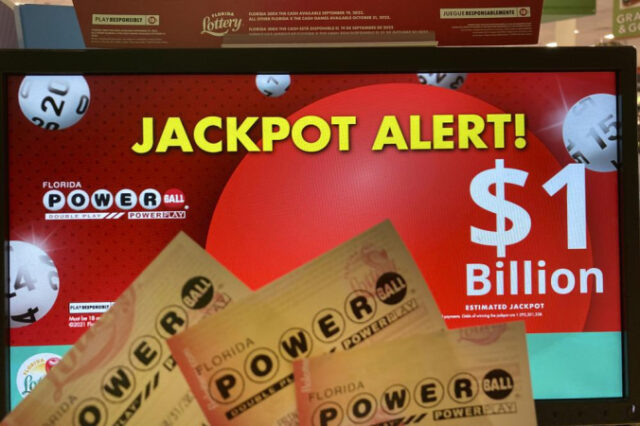
The jackpot for Powerball’s Monday night drawing is a whopping $1 billion.
Sort of, anyway.
The annuity option is higher than it has been, relative to the cash option, due to higher interest rates that make it possible for the game to fund larger annuitized prizes, according to the Multi-State Lottery Association, which runs Powerball. The cash option, however, is driven by ticket sales.
Almost $120 million would be shaved off the top
So what would you pay in taxes if you were to beat the odds and land the jackpot?
Assuming you were like most winners and chose the cash option, a 24% federal tax withholding would reduce the $497.3 million by $119.4 million.
This means that unless you were able to reduce your taxable income by, say, making charitable donations, another 13% — or about $64.7 million — would be due to the IRS. That would translate into $184.1 million going to federal coffers in all, leaving you with $313.2 million.
State taxes could also be due, depending on where the ticket was purchased and where you live. While some jurisdictions have no income tax — or do not tax lottery winnings — others impose a top tax rate of more than 10%.
Nevertheless, the winner would end up with more money than most people see in a lifetime or two.
And, of course, you probably won’t need to worry about how much the jackpot really would deliver — the chance of a single ticket matching all six numbers drawn in Powerball is about 1 in 292 million.
Meanwhile, Mega Millions’ jackpot is $87 million ($42.8 million cash) for Tuesday night’s drawing. The chance of your ticket hitting the jackpot in that game is roughly 1 in 302 million.
Disclaimer
Artificial Intelligence Disclosure & Legal Disclaimer
AI Content Policy.
To provide our readers with timely and comprehensive coverage, South Florida Reporter uses artificial intelligence (AI) to assist in producing certain articles and visual content.
Articles: AI may be used to assist in research, structural drafting, or data analysis. All AI-assisted text is reviewed and edited by our team to ensure accuracy and adherence to our editorial standards.
Images: Any imagery generated or significantly altered by AI is clearly marked with a disclaimer or watermark to distinguish it from traditional photography or editorial illustrations.
General Disclaimer
The information contained in South Florida Reporter is for general information purposes only.
South Florida Reporter assumes no responsibility for errors or omissions in the contents of the Service. In no event shall South Florida Reporter be liable for any special, direct, indirect, consequential, or incidental damages or any damages whatsoever, whether in an action of contract, negligence or other tort, arising out of or in connection with the use of the Service or the contents of the Service.
The Company reserves the right to make additions, deletions, or modifications to the contents of the Service at any time without prior notice. The Company does not warrant that the Service is free of viruses or other harmful components.












